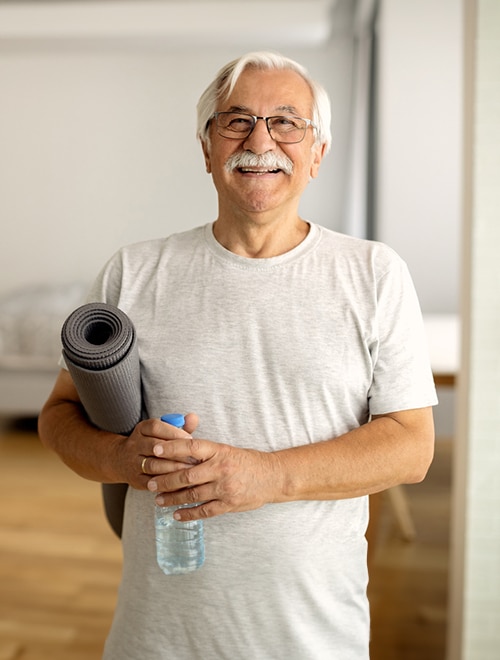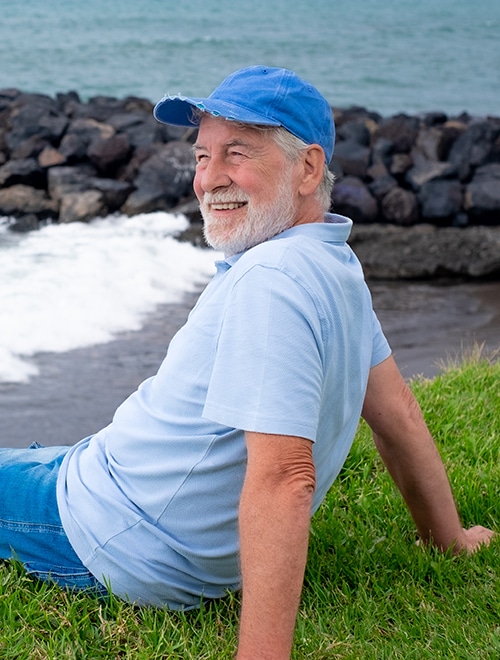- 4 min read
Why is physical activity important in prostate cancer?
Physical activity is very important for maintaining or even improving your physical and psychological health. Even though at times you may not feel like it, it’s a good idea to do some physical activity most days, if not every day.
Exercise is a planned, structured type of physical activity. It can address specific health issues and prevent other chronic diseases, such as heart disease, stroke, diabetes, high blood pressure and other cancers. There is extensive evidence that targeted exercise is very beneficial and safe when you have prostate cancer.
Current Australian recommendations state that all men should perform some exercise each week, no matter the stage of their prostate cancer or whether they are undergoing difficult treatments. Exercise is now recognised as a medicine because it’s a powerful way to improve your health before, during and after prostate cancer treatments. If you are on hormone therapy, targeted exercise is vitally important for you.
The many benefits of physical activity and exercise are:
- Help you maintain your independence and wellbeing
- Improve your physical function and abilities
- Help you sleep better
- Help with and prevent tiredness and fatigue
- Make you feel more energised
- Lift your mood and help with anxiety and depression
- Maintain your muscle and bone health
- Improve your cardiovascular health
- Support your metabolism
- Improve your quality of life
- Help you maintain a healthy weight
- Prevent or reduce constipation (with a healthy diet rich in fibre and wholefoods)
- Help reduce the side effects of treatments, such as hormone therapy and chemotherapy
- Help you tolerate prostate cancer treatments and improve your recovery after surgery
- Slow the progression of your disease
You can learn more about why exercise is important before, during and after treatment in the Pre- & Rehabilitation section of your toolkit.
What are the most effective types of exercise?
Any physical activity you can do will be beneficial. However, the most effective forms of exercise are:
- Cardiorespiratory exercise, such as fast walking, jogging, cycling and swimming
- Resistance training exercises, such as lifting weights, stair climbing and high intensity resistance workouts
It’s a good idea to do a combination of both forms of these exercises regularly (cardiovascular and resistance). You can also include sports such as golf and bowling or try some gentle exercise, such as walking each day, yoga, Pilates or Tai Chi. Any movement that raises your heart rate, makes you breathe faster and deeper, and contracts your muscles forcefully is beneficial.
Regular exercise, in any form, is better than none. It can give you more energy and a positive outlook to help you cope with your prostate cancer treatments and enhance your recovery.
How often should you exercise?
It is best to do some form of physical activity every day if you can. If you are relatively healthy, then you can also aim to do:
- 120 to 150 minutes of moderate to vigorous exercise each week
- At least 2 resistance training sessions per week
What if you don’t know where to start or you have specific needs?
It’s a good idea to talk to your GP, member of your healthcare team or a PCFA nurse if you are unsure how to get started with exercising or don’t know what type of exercises you should do. They can discuss a tailored exercise program and what level of exercise is right for you.
The following links also provide good general resources to get you started on an exercise program:
- Exercise is Medicine Australia at www.exerciseismedicine.com.au
- My Exercise Medicine at www.myexercisemedicine.net
If you are experiencing disease and/or treatment-related issues, you may need a more targeted exercise prescription. In this case it is important you consult with an accredited exercise physiologist (AEP), who will assess your health and fitness and then prescribe a targeted exercise program that is safe and effective for you. To find an AEP near you, visit www.essa.org.au/find-aep or call them on (07) 3171 3335.
Medicare may pay for all or a portion of the cost of a consultation with an AEP. You will need to ask your GP for a chronic disease management plan (CDM) that includes a referral to an AEP.
What exercises can you do if you have urinary incontinence issues?
If you have urinary incontinence issues, avoid high impact exercises that involve running or jumping, abdominal exercises or any exercises that put downward pressure on your pelvic floor. For more information on pelvic floor-friendly exercises, visit www.pelvicfloorfirst.org.au.
A continence nurse or continence physiotherapist can help you with:
- Pelvic floor exercise education
- Developing pelvic floor muscles and general exercise programs specifically for you
Ask your doctor for a referral or contact the Continence Foundation of Australia to find your local adviser (www.continence.org.au). You can also contact the Australian Physiotherapy Association at www.physiotherapy.asn.au.
Follow the link to learn how to perform pelvic floor exercises correctly: Pre- & Rehabilitation
What else can you do to help you stay active?
Having an exercise partner can help you to stay motivated or get started. If you need support, you can talk to your partner, family members, a friend or a prostate cancer support group, or reach out to your GP, a member of your healthcare team or a PCFA nurse. Find out about the support available to you by following the link to: PCFA Nursing & Support.
You can also find out more about how you can improve your diet and lifestyle and support your mental wellbeing by following the links below:
Healthy Diet & Lifestyle
Psychological Wellbeing
You can also learn how side effects from treatments can affect your health and wellbeing by following the link to: Side Effects
Key Points
- Being physically active most days or every day keeps you physically and mentally strong and helps you feel better, maintain your independence, improve your cardiovascular health and gives you a better night’s sleep, among many other benefits
- Structured physical activity is called exercise and is beneficial and safe in prostate cancer
- Doing a combination of cardiovascular and resistance exercises are best, but any physical activity is better than being sedentary
- Being active may reduce treatment side effects and positively affect your physical and mental health
- Talk to your healthcare team, PCFA nurse or an exercise physiologist if you need help with an exercise program or have specific needs
- Combine exercise with healthy eating and looking after your mental health to support your body and mind
- Get support from friends, family, exercise partners, support groups or health professionals to get you started and help you stay motivated






